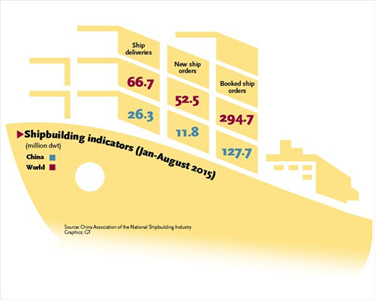
Contracting trade is the main reason for the lower figure: analysts
New shipbuilding orders fell 68.3 percent year-on-year during the January-August period, data from the China Association of the National Shipbuilding Industry (CANSI) showed on Wednesday.
Experts said the discouraging figure reflected tough conditions in the global shipping market, and it will exacerbate the problems of the country's struggling shipyards.
Due to the slack market, order backlogs and prices for new ships also fell, according to the CANSI.
During the eight months, China's shipbuilders completed 14.6 percent more ships by tonnage than a year earlier, reducing the order backlog, which was down 12.1 percent at the end of August, CANSI data showed.
The 1,447 medium-sized and large shipbuilders monitored by the association generated aggregate operating income of 414.47 billion yuan ($65.1 billion) from January to July, up 4.2 percent from the same period in 2014. Combined profits fell 22 percent to 11.99 billion yuan.
Experts said the industry's woes were mainly caused by weak demand in the shipping market, caused by contracting trade.
China's total trade during the first eight months of the year stood at 15.67 trillion yuan, down 7.7 percent year-on-year, according to data released by the General Administration of Customs on September 8.
Exports slid 1.6 percent, while imports plunged a staggering 14.6 percent.
"Other key indexes such as the China export container freight price index and the Baltic Dry Index were also weak for the first eight months of the year, compared with figures in previous years, and shipping companies in the country are having a hard time," Zheng Ping, chief analyst of industry portal chineseport.cn, told the Global Times Wednesday.
"The cloudy economic picture discouraged shipping firms from placing more orders," said Zhang Yongfeng, a market analyst with the Shanghai International Shipping Institute.
"Now most of the orders are for large vessels, such as 20,000-TEU (20-foot equivalent unit) container ships. Smaller vessels are disappearing and that means only leading shipbuilders can secure orders," Zheng said.
Smaller shipping companies face financing difficulties even if they want to place orders, Zheng said.
On September 9, China Ocean Shipping (Group) Co signed a deal with four Chinese shipyards worth $1.5 billion for 11 massive 20,000-TEU container carriers.
Experts said the huge drop this year also reflected an unusually high base of comparison. In 2014, Zhang noted, there was a rebound in ship orders.
"There was speculation in 2014 that the shipping market had bottomed out after years of stagnation, so many shipping companies placed orders. A surge in demand for oil tankers also yielded some orders, as companies ramped up their crude transportation and storage capacity," Zheng said. But with global crude prices continuing to fall, companies are becoming more cautious, Zheng said.
Chinese shipbuilders are also facing competition from overseas rivals, mainly from South Korea and Japan.
"China's shipbuilding capacity alone can meet global demand. But Japanese and South Korean companies have taken advantage of their nations' weaker currencies to snare some of these orders," Zheng said.
Troubles in the nation's shipyard sector could lead to a shakeout in the industry. China on Sunday unveiled a 20-page agenda to further reform its State sector. The market-oriented reform calls for mergers and acquisitions among State-owned enterprises.
Market rumors have been circulating since April of a possible merger between State-owned China State Shipbuilding Corp and China Shipbuilding Industry Corp. The speculation followed China's move to merge two leading high-speed train producers in an effort to boost exports of its railway technology.
"The typical timing for mergers and acquisitions is when an industry has hit bottom and larger companies can snap up smaller ones," Zheng said.
However, Zhang noted that this is an industry saddled with overcapacity, so companies will take a cautious approach in enlarging their scale.
"Companies may instead only choose to make some targeted purchases of assets that will really add value," he said.


















































